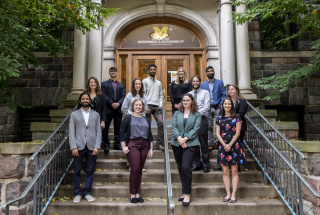Meet the future
The world needs bold leaders ready to tackle urgent environmental challenges. At SEAS, we say “bring it on.” We’re the architects of a new tomorrow: transforming research into action to create a healthier planet for all.
Why SEAS?

U-M’s Climate Week 2025 aims to boost climate engagement
As U-M continues its tradition of celebrating Earth Month, planning is underway for an expanded Climate Week gathering in the fall. U-M Climate Week 2025 will bring together U-M students, faculty, staff, alumni and community members for a weeklong series of events and activities aimed at increasing climate engagement and fostering ideas and solutions that will create a healthier, more equitable planet. It will take place from Sept. 27 to Oct. 5 on the Ann Arbor campus.
The Capstone Conference is a celebration of graduate student research at SEAS that incorporates thesis, practicum and master's project student presentations. Concurrent presentations are organized into themed sessions that will take place in classrooms surrounding the First Floor Commons. The SEAS community is encouraged to attend the presentations as well.
Academic Rigor—Real-World Impact

Research News
The latest in research from SEAS faculty and students

Impact Stories
Master's projects produce real-world throughout the region—and the globe.

Community Highlights
Our SEAS community is recognized through notable awards and honors across all disciplines.

In the Media
Our experts in the field weigh in on issues across a wide spectrum of media outlets.
Themes
Sustainability Themes cut across all specializations—and give students, faculty, and partners a chance to dig deeper into a particular area of impact and interest. Themes are also used as rallying points for cross-campus research, teaching and civic engagement collaborations.
Bold Leaders: Inventing Tomorrow

"The Great Lakes University"
The Great Lakes are the great uniters. That’s how SEAS Professor of Practice and Engagement Mike Shriberg (MS ’00, PhD ’02) describes these valuable resources.
Read more

Meet the Future of Sustainable Food Systems: A Focus on Soil Health and Crop Diversity
Although the global population has more than tripled since 1950, studies show that modern intensive agriculture, which largely ignores ecological practices and focuses on a small number of high-yielding commodity crops reliant on chemical fertilizers and pesticides, did not grow out of necessity, but rather a drive for profits.
Read more

Island Biology: “A Lot of Bang for Your Conservation Buck”
Islands, which comprise just 5.3% of the planet’s land area, hold about 20% of the world’s wildlife and 50% of endangered species. They offer boundless opportunities to inform basic ecological science and applied conservation biology, and are integral to protecting global biodiversity.
Read more
Upcoming Seas Events
Catalyzing Climate Action for a Resilient Asia and the Pacific
9:00 amJoin us for a conversation with ADB's Chief Economist: Albert Park The...
2025 SEAS/PitE Spring Commencement
2:00 pmGreat Lakes Seminar Series: Corey Krabbenhoft
11:00 amTitle: Spawning and sustenance: exploring two key aspects of Great...















